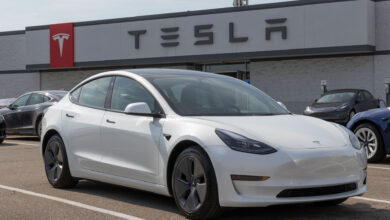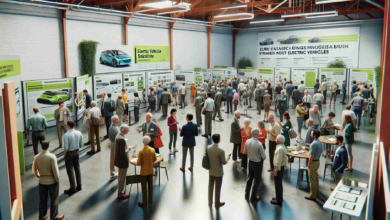Europe doesn’t know whether to tax or subsidise electric cars – Euractiv

Receive the Transport Brief in your inbox by subscribing here.
Europe wants cheap electric cars – just not too cheap.
The slowdown of electric vehicle sales in Europe has received a lot of coverage in recent months. The International Energy Agency’s latest outlook links slower growth in German sales with the country’s phase-out of key purchase subsidies for buyers.
More generous incentives would indeed boost electric vehicle (EV) sales and would help get Europe back on track to meet its transport decarbonisation ambitions.
But currently, the European Commission is mulling the opposite path – specifically, slapping higher tariffs on imports of cheap Chinese EVs.
Today the EU charges 10% on Chinese electric vehicles coming into the bloc, but observers expect the Commission to hike this considerably, with an announcement due in the next two weeks.
Europe’s dilemma – whether to subsidise or tax – reflects a fundamental conflict between distinct policy goals. Cheaper Chinese EVs will help Europe rapidly decarbonise. But if these imports decimate European car making regions, then support for the transition will quickly evaporate.
The ideal outcome – cheap European-made electric cars – seems unlikely any time soon, if ever. European car makers have been criticised for not producing smaller (and cheaper) EVs, but it is understandable that they do not want to go head-to-head against their Chinese competitors on price alone.
France may have found an elegant half-solution to this dilemma: Here, purchase incentives are limited only for cars which have a production carbon footprint of less than 14.75 tonnes of CO2. Not coincidentally, this very specific limit excludes many EVs produced in China, where industrial processes remain very polluting.
With this approach, at least public money is not being used to benefit Europe’s industrial competitors.
In the medium-term, the question of purchase incentives will become moot. The IEA report estimates that the price of electric vehicles will reach parity with traditional vehicles in Europe by 2025-2028. Though whether these cost reductions will be achieved by European or Chinese car manufacturers is another question.
But between now and then European car drivers will face quite a few sticks – they will soon be paying for the carbon they emit, as road transport comes under the EU Emissions Trading Scheme. And the de facto internal combustion engine ban remains on the books for 2035.
So perhaps it may be wise to maintain a few carrots for motorists, in the form of EV subsidies. Even if governments are taxing with one hand and subsidising with the other.
Europe’s unfinished transport files: Technical detail and sovereignty tensions
Several key transport files await new and returning lawmakers in September. Some files are deeply technical – see for example the proposed new rules concerning the weight and size of trucks. More fundamentally, however, these proposed laws all seek to manage the inherent contradiction of a common European travel area, which is still largely governed at a national level.
German conservatives make internal combustion engines an election issue
German conservative parties CDU and CSU have launched a campaign against the 2035 de-facto ban of new combustion engine cars, an issue the party says is critical for the June EU elections.
Germany accused of playing favourites with €1.7 billion support for freight rail
Private competitors have reacted against a European Commission-approved €1.7 billion German subsidy scheme to support shorter freight trains, which is expected to mainly benefit state-owned DB Cargo.
EU election results threaten Green Deal, sustainability experts say
The June EU election results will jeopardise the implementation of the Green Deal, according to a majority of experts questioned by the Institute for European Environmental Policy (IEEP).
French, Belgian astronauts named next Europeans to fly to ISS
France’s Sophie Adenot and Belgium’s Raphael Liégeois will be the first two from a new class of European astronauts to blast off to the International Space Station, the European Space Agency said Wednesday (22 May).
[Edited by Zoran Radosavljevic]




